 During the process of building support for turning my novel Cassandra, Chanting into a movie (working title Ballot Holes), several have asked me why I published Cassandra anonymously in 2008. In Cassandra, I imagined foreign powers infiltrating voting machine companies to steal a presidential election…not because they care who won, but because they know this is the clearest shot at undermining American democracy.
During the process of building support for turning my novel Cassandra, Chanting into a movie (working title Ballot Holes), several have asked me why I published Cassandra anonymously in 2008. In Cassandra, I imagined foreign powers infiltrating voting machine companies to steal a presidential election…not because they care who won, but because they know this is the clearest shot at undermining American democracy.
In Greek mythology, as I detail in the book, Cassandra was the Trojan beauty with the gift of prophecy. She was eventually cursed by Apollo to make certain that her prophesies would fall only on deaf ears. (More about the novel, Cassandra, below. Read The BRAD BLOG's 2008 review by Ellen Theisen here.)
The decision to publish near-future prophecy anonymously was not hard at the time. As an insider at a voting machine company and someone who is critical of the federal Election Assistance Commission (EAC), I didn't want the challenges with respect to EAC certification to become more difficult. The EAC creates the rules by which electronic voting and tabulation systems must comply in order to be used in states which require federally certified machines. In some cases, the rules are onerous and do not result in better voting systems. At the time, I was an executive and major shareholder in the Populex Corporation. We had developed a voting system that allowed voters to use a computer to mark a paper ballot, to then be tabulated by an optical-scan system, or even by hand. (Similar so-called "Ballot Marking Devices" or BMDs are currently in development in places like Los Angeles County in California.)
Complying with the EAC rules (and they change them from time to time) is a very expensive proposition. A book about the dangers posed by our then current (and, mostly still-in-use) electronic voting systems, many of which had previously received EAC approval, might have been seen as a slight to the EAC. Although our company had received EAC approval, it was best not to do anything that they might consider tweaking them...
The EAC was established by the Help America Vote Act of 2002 (HAVA) --- A misnomer if ever there was one. HAVA was passed in the aftermath of the 2000 presidential election in which chads were hanging and many argued that votes could not be tallied accurately.
So, America didn't need help voting…America needed help counting! And America still needs help making voting less vulnerable with tallies more overseeable by the public.
HAVA created committees of knowledgeable experts to create Voluntary Voting System Guidelines (my emphasis). Trouble is, among these experts were those who had vested interests in extant voting system technology, including many officials who worked for the private vendors hoping to receive certification from the EAC. Over and over and over again the independent experts urged the EAC to require, at the very least, an auditable paper trail…what has come to be known in the lingo as a Voter Verified Paper Audit Trail or the tongue-twisting acronym VVPAT. Computer system experts said time and time again that a VVPAT would not solve all paths to hacking, but it might help to deter at least some of them. I'm still astounded that EAC did not insist that an auditable paper trail --- seemingly, the most minimal requirement --- did not get put into the federal standards. I cannot find a rational explanation.
The plot in Cassandra imagines throwing an election via the computer code in both hand-marked paper ballot scanners and in touch-screen machines. Because the hacked computer code never uses a party or candidate name, the hack goes undetected by the fictionalized "Federal Bureau of Elections".
In real life, after experts left the EAC's commissions in frustration and documentaries were made (see Dorothy Fadiman's Stealing America Vote by Vote or HBO's Hacking Democracy or David Earnhardt's Uncounted or Patty Sharaf's Murder, Spies and Voting Lies), papers written (among them, Stanford Professor David Dill and Johns Hopkins Professor Aviel Rubin write in Scientific American, and former ACM president Barbara Simons and others give speeches), I decided to write a fictionalized version of how elections could be hacked and what would happen as a result. I mean, if American wouldn't listen to the facts, maybe some fiction could get the blood boiling.
The book idea caught on, but Cassandra is still chanting, and officials are still not listening. So, now we are trying to make a movie based on the book…to reach an even larger audience. You can help…please see our Kickstarter page for the Ballot Holes movie here...
Sandy Morganstein received a BS in Physics from MIT and an MS in Astrophysics from the University of Chicago. He holds more than 35 US patents, mostly in telecommunications. His most famous invention is the "Automated Attendant" ("If you know your party's extension, dial it anytime during this recording..."). Other patented inventions include methods and apparatus for voting systems with voter-verifiable paper trails. Follow him on Twitter here: @BallotHolesMovi


 A Pretty Weak 'Strongman': 'BradCast' 10/30/25
A Pretty Weak 'Strongman': 'BradCast' 10/30/25 'Green News Report' 10/30/25
'Green News Report' 10/30/25
 Proposal for 'First Politically Viable Wealth Tax' Takes Shape in CA: 'BradCast' 10/29/25
Proposal for 'First Politically Viable Wealth Tax' Takes Shape in CA: 'BradCast' 10/29/25 Monster Storm, Endless Wars, Gamed Elections:
Monster Storm, Endless Wars, Gamed Elections: 'Green News Report' 10/28/25
'Green News Report' 10/28/25 Let's Play 'Who Wants
Let's Play 'Who Wants Sunday 'Cartoonists Dilemma' Toons
Sunday 'Cartoonists Dilemma' Toons Exiled NOAA Scientists Resurrect Critical Disaster Database: 'BradCast' 10/23/25
Exiled NOAA Scientists Resurrect Critical Disaster Database: 'BradCast' 10/23/25  'Green News Report' 10/23/25
'Green News Report' 10/23/25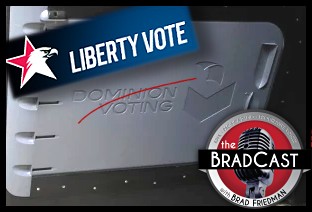 Trump-Allied GOP Partisan Buys Dominion Voting Systems: 'BradCast' 10/22/25
Trump-Allied GOP Partisan Buys Dominion Voting Systems: 'BradCast' 10/22/25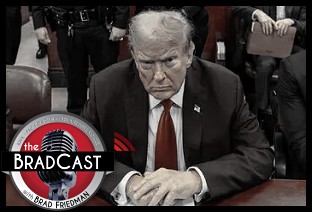 Trump, Republican Law(lessness) & (Dis)Order: 'BradCast' 10/21/25
Trump, Republican Law(lessness) & (Dis)Order: 'BradCast' 10/21/25 'Green News Report' 10/21/25
'Green News Report' 10/21/25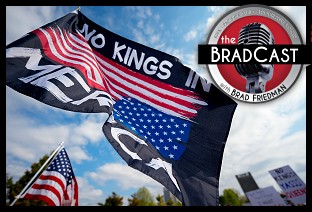 Celebrating 'No Kings': 'BradCast' 10/20/25
Celebrating 'No Kings': 'BradCast' 10/20/25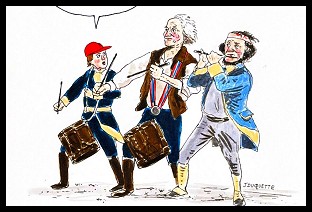 Sunday 'How It Started' Toons
Sunday 'How It Started' Toons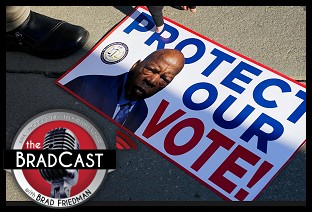 SCOTUS Repubs Appear Ready to Gut Rest of Voting Rights Act: 'BradCast' 10/16/25
SCOTUS Repubs Appear Ready to Gut Rest of Voting Rights Act: 'BradCast' 10/16/25 'Green News Report' 10/16/25
'Green News Report' 10/16/25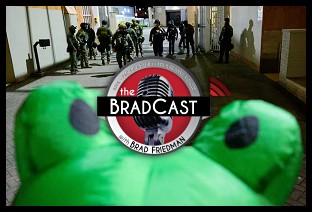 The 'Epstein Shutdown' and Other Autocratic Nightmares: 'BradCast' 10/15/25
The 'Epstein Shutdown' and Other Autocratic Nightmares: 'BradCast' 10/15/25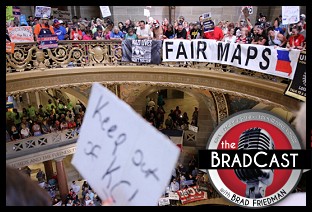 Group Vows to Block MO's GOP U.S. House Gerrymander: 'BradCast' 10/14/25
Group Vows to Block MO's GOP U.S. House Gerrymander: 'BradCast' 10/14/25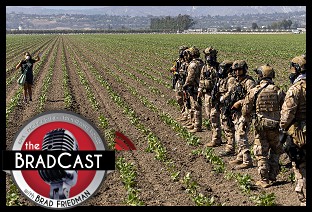 Trump Labor Dept. Warns Trump Policies Sparking Food Crisis: 'BradCast' 10/9/25
Trump Labor Dept. Warns Trump Policies Sparking Food Crisis: 'BradCast' 10/9/25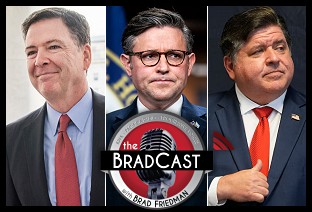 Trump's Losing Battles: 'BradCast' 10/8/25
Trump's Losing Battles: 'BradCast' 10/8/25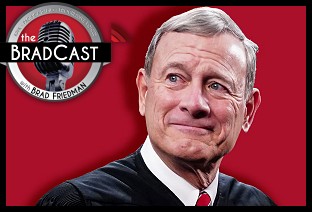 Trump, Roberts and His Stacked, Packed and Captured SCOTUS: 'BradCast' 10/7/25
Trump, Roberts and His Stacked, Packed and Captured SCOTUS: 'BradCast' 10/7/25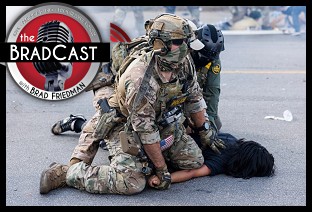 Trump Attempting His 'Invasion from Within': 'BradCast' 10/6/25
Trump Attempting His 'Invasion from Within': 'BradCast' 10/6/25 Biden Budget Expert: Mass Firings in Shutdown 'Illegal': 'BradCast' 10/2/25
Biden Budget Expert: Mass Firings in Shutdown 'Illegal': 'BradCast' 10/2/25 Why is DOJ Suing 'Blue' States for Their Voter Databases?: 'BradCast' 10/1/25
Why is DOJ Suing 'Blue' States for Their Voter Databases?: 'BradCast' 10/1/25
 VA GOP VOTER REG FRAUDSTER OFF HOOK
VA GOP VOTER REG FRAUDSTER OFF HOOK Criminal GOP Voter Registration Fraud Probe Expanding in VA
Criminal GOP Voter Registration Fraud Probe Expanding in VA DOJ PROBE SOUGHT AFTER VA ARREST
DOJ PROBE SOUGHT AFTER VA ARREST Arrest in VA: GOP Voter Reg Scandal Widens
Arrest in VA: GOP Voter Reg Scandal Widens ALL TOGETHER: ROVE, SPROUL, KOCHS, RNC
ALL TOGETHER: ROVE, SPROUL, KOCHS, RNC LATimes: RNC's 'Fired' Sproul Working for Repubs in 'as Many as 30 States'
LATimes: RNC's 'Fired' Sproul Working for Repubs in 'as Many as 30 States' 'Fired' Sproul Group 'Cloned', Still Working for Republicans in At Least 10 States
'Fired' Sproul Group 'Cloned', Still Working for Republicans in At Least 10 States FINALLY: FOX ON GOP REG FRAUD SCANDAL
FINALLY: FOX ON GOP REG FRAUD SCANDAL COLORADO FOLLOWS FLORIDA WITH GOP CRIMINAL INVESTIGATION
COLORADO FOLLOWS FLORIDA WITH GOP CRIMINAL INVESTIGATION CRIMINAL PROBE LAUNCHED INTO GOP VOTER REGISTRATION FRAUD SCANDAL IN FL
CRIMINAL PROBE LAUNCHED INTO GOP VOTER REGISTRATION FRAUD SCANDAL IN FL Brad Breaks PA Photo ID & GOP Registration Fraud Scandal News on Hartmann TV
Brad Breaks PA Photo ID & GOP Registration Fraud Scandal News on Hartmann TV  CAUGHT ON TAPE: COORDINATED NATIONWIDE GOP VOTER REG SCAM
CAUGHT ON TAPE: COORDINATED NATIONWIDE GOP VOTER REG SCAM CRIMINAL ELECTION FRAUD COMPLAINT FILED AGAINST GOP 'FRAUD' FIRM
CRIMINAL ELECTION FRAUD COMPLAINT FILED AGAINST GOP 'FRAUD' FIRM RICK SCOTT GETS ROLLED IN GOP REGISTRATION FRAUD SCANDAL
RICK SCOTT GETS ROLLED IN GOP REGISTRATION FRAUD SCANDAL VIDEO: Brad Breaks GOP Reg Fraud Scandal on Hartmann TV
VIDEO: Brad Breaks GOP Reg Fraud Scandal on Hartmann TV RNC FIRES NATIONAL VOTER REGISTRATION FIRM FOR FRAUD
RNC FIRES NATIONAL VOTER REGISTRATION FIRM FOR FRAUD EXCLUSIVE: Intvw w/ FL Official Who First Discovered GOP Reg Fraud
EXCLUSIVE: Intvw w/ FL Official Who First Discovered GOP Reg Fraud GOP REGISTRATION FRAUD FOUND IN FL
GOP REGISTRATION FRAUD FOUND IN FL

































